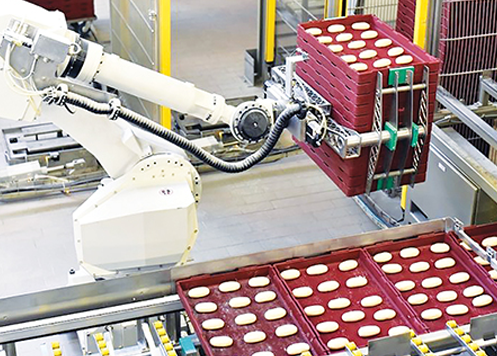Role of Oil-free Air Compressors in Food Safety

With the growing demand for modernization and mechanization in today’s competitive world, the food industry is under severe pressure to increase productivity with the least human touch points. Since the pandemic unleashed its devastating severity on human lives, the food industry also suffered as companies had to remain closed on account of human casualties and on the restriction of human movements, which emphasized the need for automated plants more than ever before.
The food industry, one of the largest industries in India that ranks 10th in the world, is poised to grow at 10% year on year and invariably will have a fundamental structure of sorting, grading, mixing, processing, conveying, and packing that contributes to 70% of the total business. And a significant piece of equipment needed in all these steps is air compressors. Compressed air is required across various stages in food processing, from sorting and moving to freezing and packaging, from peeling and cutting to maintaining cleanliness. Businesses will consequently need to invest in oil-free screw air compressors to ensure that the food products’ quality and safety are not compromised to boost the efficiency of these processes.
The need for oil-free air compressors
The accidental presence of contaminants can enter the food chain at all stages: in packaging and transporting materials for raw ingredients, the improper use of machine oils or lubricants, and upstream packaging, process, and transport materials. The presence of a contaminant should be reduced to as low as reasonably achievable, clearly establishing the priority for all aspects of food production.
Hence, operations in the food industry, comprising food and vegetable, meat and poultry, fisheries, milk, and dairy, require compressed air that is completely oil-free. The compressed air applications demand wide operating temperatures of 0-45°C, stringent air purity standards higher than ISO 8573-Class I, high levels of safety, and eco-friendly operation with efficient compressors capable of running with minimal maintenance and for more extended periods.
The increased awareness of the impacts on the quality and safety of the end products using air with oil content has further increased the demand for Class-‘0’ oil-free air in the industry. Businesses that have implemented oil-free air compressors have experienced improvements in the quality and safety of their products. Some of these benefits include:
1. Quality during packaging: Since the compression chamber is not lubricated, there is no chance that oil will pass through and come in touch with the packaged food or beverage.
2. Prevention of contamination and interruptions in operations: When air compressors are used to move powdered food, such as cocoa powder, oil-free air avoids product contamination. Automated lines for filling, packing, or bottling require compressed air, and when these lines are contaminated with oil, the equipment can stop operating and halt the entire production line, which can have a significant impact on the profitability of the company. The automated lines do not halt while using oil-free compressors, resulting in continuous operations without interruptions.
3. Maintaining cleanliness: The instruments and utensils in the food processing units are cleaned using compressed air. With oil in the chamber, the risk of contamination of the food containers can be health hazardous. But oil-free air ensures the safe cleaning of containers, utensils, and instruments.
4. Air Purity: Beverages are pumped with air to increase their oxygen content and ‘Class 0’ oil-free air compressors guarantee the purity of the air.
With the benefits available and the emphasis on quality increasing, organizations must adapt to technological developments sooner or later. Businesses in the food industry will struggle to gain profits in the long run if they do not prioritize safety. Oil-free air compressors are essential equipment required to maintain the quality and safety of the end products in the food industry. Until recently, these compressors were expensive and used primarily by large companies that exported their products to markets with stringent standards. Today, technological advancements and market developments in oil-free technology and ‘Class 0’ certified compressors have changed the game, and every manufacturing company has access to technology that assures not only ISO:8573 (P-2):2007 ‘Class 0’ contamination-free air meeting the most stringent standards but also much higher energy savings and uptime at lower Life Cycle Costs.
The food and beverage industry must cope with increasingly demanding regulatory challenges of quality, safety, and energy efficiency while addressing the need to feed a growing population sustainably. With Class-0 oil-free air, automated processing, less human interaction, and longer operating machinery, the food processing units are in a better position today to reduce their total production costs and increase their profitability.
FMT MAGAZINE


